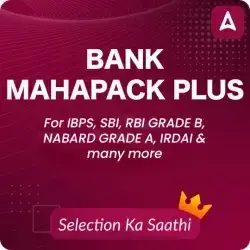The RBI Grade B Mains Exam 2025 is scheduled for 6th and 7th December 2025, and candidates should now focus on mastering the RBI Grade B Syllabus 2025 and Exam Pattern for effective preparation. With limited time left in the RBI Grade B Exam, understanding the structure of the exam, key topics, and weightage of each section is crucial.
RBI Grade B Syllabus 2025
A well-planned revision strategy focusing on concept clarity, analytical skills, and current affairs will help maximize accuracy and boost performance in this highly competitive phase. The RBI Grade B Mains Exam 2025 focuses on subjects that test candidates’ analytical, writing, and conceptual understanding. The exam includes Economic & Social Issues (ESI), Finance & Management (F&M), and an English (Descriptive) Paper.
Also Read, RBI Grade B Expected Cut Off 2025
RBI Grade B Syllabus and Exam Pattern 2025
The RBI Grade B 2025 exam is conducted in two main phases, followed by an interview round. Phase I, carrying 200 marks and lasting 120 minutes, consists of objective-type questions covering English Language (30 questions – 25 minutes), General Awareness (80 questions – 25 minutes), Quantitative Aptitude (30 questions – 25 minutes), and Reasoning (60 questions – 45 minutes).
Candidates who qualify in Phase I advance to Phase II, which includes both objective and descriptive papers on Economic & Social Issues (ESI), Finance & Management (F&M), and English (Writing Skills). For candidates applying to DEPR and DSIM streams, the Mains focuses on specialized papers in Economics, Statistics, and Quantitative Techniques, assessing deeper analytical and domain-specific knowledge.
RBI Grade B Syllabus 2025 Overview
A clear understanding of the RBI Grade B syllabus and exam pattern 2025 is essential for smart preparation. This guide provides a complete overview of Phase I and Phase II, along with exam pattern, important topics and tips for effective preparation. Here are the short summery of Syllabus and Exam Patter.
| RBI Grade B Syllabus 2025 | |
|---|---|
| Organization Name | Reserve Bank of India |
| Exam Name | RBI Grade B 2025 |
| Category | Syllabus |
| Mode of Exam | Online |
| Selection Process | Phase 1 (Objective), Phase 2 (Descriptive) & Phase 3 (Interview) |
| Phase I Exam Date | 18-19 October 2025 |
| Phase 2 Exam Date | 6-7 December 2025 |
| Negative Marking | 0.25 marks (in objective type) |
| Language of Paper | English and Hindi |
| Official Website | rbi.org.in |
RBI Grade B Exam Pattern 2025
Cracking the RBI Grade B exam demands focused preparation across core subjects such as Quantitative Aptitude, Reasoning, English and General Awareness. The RBI Grade B Exam pattern varies depending on the post applied for: General (DR), DEPR, or DSIM. To navigate the stage-wise structure and syllabus specific to each role, aspirants are advised to refer to the comprehensive guide outlined in this article.
RBI Grade B Exam Pattern for General (DR)
Here, the candidates can check the detailed RBI Grade B Exam Pattern for all the stages of the examination. As mentioned above, the RBI Grade B Exam has three stages for General (DR). Here is the detailed RBI Grade B Exam Pattern.
RBI Grade B Phase 1 Exam Pattern 2025
The RBI Grade B 2025 Phase I exam is structured with 200 multiple-choice questions, each carrying one mark, making the total score 200. Candidates are given 120 minutes (2 hours) to complete the test. For every incorrect answer, 0.25 marks are deducted as negative marking. Additionally, the exam includes sectional cut-offs, requiring candidates to meet both individual section-wise and overall cut-off scores to qualify for Phase II.
| RBI Grade B Exam Pattern For Phase 1 |
|||
| Name Of The Section | No. Of Questions | Marks | Duration |
| English Language | 30 | 30 | 25 Minutes |
| General Awareness | 80 | 80 | 25 Minutes |
| Quantitative Aptitude | 30 | 30 | 25 Minutes |
| Reasoning | 60 | 60 | 45 Minutes |
| Total | 200 | 200 | 120 Minutes |
Note- The marks scored by candidates in the RBI Grade B Phase 1 exam will not be considered in the final merit list. The merit list will be based on the marks scored by candidates in the Phase 2 exam and the interview round.
RBI Grade B Phase 2 Exam Pattern
The RBI Grade B Phase II exam combines both objective and descriptive formats to assess candidates’ in-depth knowledge and analytical skills. The exam pattern for Phase II includes papers on Economic & Social Issues, English (descriptive), and General Finance & Management, as detailed in the table below.
| RBI Grade B Exam Pattern For Phase 2 | ||||
| Name Of Paper | Type Of Paper | Time | No. Of Qs | Marks |
| Paper-I: Economic and Social Issues |
50% Objective | 30 Minutes | 30 Objective Questions | 50 |
| 50% Descriptive | 90 Minutes | 4 Descriptive Questions | 50 | |
| Paper-II: English (Writing Skills) |
Descriptive | 90 Minutes | 3 | 100 |
| Paper-III: General Finance & Management |
50% Objective | 120 Minutes | 30 Objective Questions | 50 |
| 50% Descriptive | 4 Descriptive Questions | 50 | ||
RBI Grade B Exam Pattern for DEPR
The RBI Grade B (DR) – DEPR selection process includes an Online/Written Examination followed by an Interview. Candidates must clear each phase to move forward in the recruitment process. Below are the key details of the exam pattern:
Phase I
- Paper I: Objective Type (Economics)
- Paper II: Descriptive Type (English)
- Candidates must achieve the minimum aggregate marks in both papers to qualify for Phase II.
Phase II
- Paper I: Descriptive Type (Economics)
- Paper II: Descriptive Type (Economics)
Interview Round
- The Interview carries 75 marks and plays a crucial role in the final selection.
- The final merit list is prepared based on candidates’ performance in Phase I, Phase II, and the Interview.
| RBI Grade B Exam Pattern For DEPR | |||
| Phase | Name Of Paper | Duration | Maximum Marks |
| Phase I |
Paper – I Objective Type (on Economics) | 120 Minutes | 100 |
| Paper – II English – Descriptive (To be typed with the help of a keyboard) |
120 Minutes | 100 | |
| Phase II |
Paper – I Descriptive Type (on Economics) (Question paper displayed on computer, answers to be written on paper) | 120 Minutes | 100 |
| Paper – II Descriptive Type (on Economics) (Question paper displayed on the computer, answers to be written on paper) | 120 Minutes | 100 | |
| Total | 400 | ||
RBI Grade B Exam Pattern For DSIM
The selection process for RBI Grade B (DR) – DSIM comprises an Online/Written Examination followed by an Interview. Candidates must qualify at each stage to progress further in the recruitment process. Below are the detailed exam pattern highlights:
Examination Structure
- Paper I: Objective Type (Statistics)
- Paper II: Descriptive Type (Statistics)
- Paper III: Descriptive Type
Important Details
- Candidates must secure the minimum aggregate marks in Paper I to be eligible for shortlisting in Paper II and Paper III.
- The Interview round carries 75 marks and is a key component of the final selection process.
- The final merit list is prepared based on candidates’ performance in Paper I, Paper II, Paper III, and the Interview.
| RBI Grade B Exam Pattern for DSIM | |||
| Paper | Duration | Marks | |
| Phase I | Paper-I Statistics (Objective Type) | 120 minutes | 100 |
| Phase II | Paper-II Statistics (Descriptive Type)
(Question paper displayed on a computer, answers to be written on paper) |
180 minutes | 100 |
| Paper-III English (Descriptive) (To be typed with the help of a keyboard) |
90 minutes | 100 | |
| Total | 300 | ||
RBI Grade B Syllabus 2025
The RBI Grade B 2025 exam evaluates candidates across key areas such as General Awareness, English, Quantitative Aptitude, and Reasoning in Phase I. Phase II emphasizes specialized subjects like Economic & Social Issues, Finance & Management, and Descriptive English, with the structure varying by post General (DR), DEPR, or DSIM. For the General (DR) stream, the primary focus remains on Reasoning, Quantitative Aptitude, English, and General Awareness.
RBI Grade B Syllabus for DR (General)
RBI Grade B Syllabus 2025 for Phase 1 has four subjects. You can access the section-wise syllabus for RBI Grade B.
- English Language
- General Awareness
- Quantitative Aptitude
- Reasoning Ability
RBI Grade B Phase I Syllabus For General (DR)
The RBI Grade B 2025 Phase I General (DR) exam consists of four sections: English Language, Reasoning Ability, Quantitative Aptitude, and General Awareness. Below is a complete breakdown of the topics covered in each section for the Phase 1 examination.
| RBI Grade B Syllabus For Phase I General (DR) | |||
|---|---|---|---|
| English Language | Reasoning Ability | Quantitative Aptitude | General Awareness |
| Reading Comprehension | Puzzles | Data Interpretation | Indian Banking Systems |
| Cloze Test | Seating Arrangements | Inequalities (Quadratic Equations) | Indian Financial Systems |
| Fillers | Direction Sense | Number Series | Govt. Schemes and Policies |
| Error Detection | Blood Relation | Approximation or Simplification | Current Affairs |
| Vocabulary-based questions | Syllogism | Data Sufficiency | Static Awareness |
| Sentence Improvement | Order and Ranking | Miscellaneous Arithmetic Problems | Monetary Plans |
| Jumbled Paragraph | Coding-Decoding | Quantity Comparison (Q1 & Q2) | National Institutions |
| Phrase Replacement/ Phrase Correction | Machine Input-Output | Banking Terms | |
| Match The Column | Inequalities | ||
| Word Swap | Alpha-Numeric-Symbol Series | ||
| Word Rearrangement | Data Sufficiency | ||
| Idioms | Logical Reasoning (Passage Inference, Statement, Assumption, Conclusion, Argument) |
||
| Paragraph /Sentences Restatement | |||
| Paragraph-Based Questions | |||
| Paragraph Fillers | |||
RBI Grade B Phase II Syllabus For General (DR)
In the Phase 2 exam of the RBI Grade B officer, there are 3 Papers, viz.
- Paper I (Economic and Social Issues)
- Paper II (English Writing Skills)
- Paper III (General Finance and Management)
We have shared the detailed updated RBI Grade B Syllabus for Phase 2.
RBI Grade B Syllabus For Phase II Paper 1 General (DR): Economic and Social Issues
The detailed topic-wise syllabus for RBI Grade B Phase 2 Paper I for Economic and Social Issues is provided below:
|
Syllabus For Economic and Social Issues |
|
| Category | Important Topics |
| Growth & Development | National Income & Per Capita Income |
| Poverty Alleviation & Employment | |
| Sustainable Development & Environment | |
| Economic Landscape | Economic History |
| Industrial & Labour Policy Changes | |
| Monetary & Fiscal Policy (Post-1991 Reforms) | |
| Economic Survey & Union Budget Priorities | |
| Financial System | Money & Financial Markets |
| Role of Banks & Reserve Bank of India | |
| Public Finance | |
| Political Economy’s Influence | |
| Economic Sectors | Industrial Developments |
| Importance of Agriculture | |
| Services Sector Growth | |
| Globalization | Opening Up of the Indian Economy |
| Balance of Payments Explained | |
| Export-Import Policy | |
| International Economic Institutions (IMF, World Bank, WTO) | |
| Regional Economic Cooperation & International Issues | |
| Social Structure | India’s Multiculturalism |
| Demographic Trends & Analysis | |
| Urbanisation & Migration Impact | |
| Gender Issues & Social Justice | |
RBI Grade B Syllabus For Phase II Paper 2 General (DR): English Writing Skills
The RBI Grade B Syllabus 2025 for Phase 2 Paper II will be descriptive. The paper on English shall be framed in a manner to assess the writing skills, including expression and understanding of the topic
RBI Grade B Syllabus For Phase II Paper 3 General(DR): General Finance and Management
The RBI Grade B Syllabus 2025 for Phase 2 and Paper III includes General Finance and Management. We have shared the detailed topic-wise syllabus for the convenience of the aspirants:
|
Syllabus For Finance and Management |
|
| Category | Topics |
| Financial System | Structure and Functions Of Financial Institutions |
| Functions Of the Reserve Bank of India | |
| Banking System in India – Structure and Developments, Financial Institutions – SIDBI, EXIM Bank, NABARD, NHB, NaBFID, etc. | |
| Recent Developments in the Global Financial System and Its Impact on the Indian Financial System | |
| Role Of Information Technology in Banking and Finance | |
| Non-Banking System | |
| Developments in Digital Payments | |
| Financial Markets | Primary and Secondary Markets (Forex, Money, Bond, Equity, etc.), function, instruments, and recent developments. |
| General Topics | Financial Risk Management |
| Basics of Derivatives | |
| Global financial markets and International Banking-broad trends and latest developments | |
| Financial Inclusion | |
| Alternate source of finance, private and social cost-benefit, Public-Private Partnership | |
| Corporate Governance in the Banking Sector | |
| The Union Budget – Concepts, approach and broad trends | |
| Basics of Accounting and Financial Statements- Balance Sheet, Profit and Loss, Cash Flow Statements, Ratio Analysis | |
| Inflation: Definition, trends, estimates, consequences, and remedies (control): WPI, CPI -components and trends; striking a balance between inflation and growth through monetary and fiscal policies. | |
| Management | Fundamentals of Management & Organisational Behaviour |
| Introduction to management: Evolution of management thought | |
| Management functions and Managerial roles | |
| Meaning & concept of organisational behaviour; Personality: meaning, factors affecting personality, Big Five model of personality | |
| Perception: concept, perceptual errors. Motivation: Concept, importance, Content theories and process theories | |
| Leadership: Concept, Theories | |
| Emotional Intelligence: Concept, Importance, Dimensions | |
| Analysis of Interpersonal Relationships | |
| Conflict: Concepts, Sources, Types, and Management of Conflict | |
| Organisational Development (OD) | |
| Ethics At The Workplace and Corporate Governance | |
| Meaning of ethics, why ethical problems occur in business | |
| Theories of ethics | |
| Ethical Principles in Business | |
| Corporate Governance | |
| Communication | |
RBI Grade B Syllabus for DEPR
The syllabus for RBI Grade B (DR) DEPR is as per the specialisation. The syllabus pertains to core economics and is generally similar to the syllabus for a Master’s Degree in economics.
| RBI Grade B Syllabus for DEPR | |
|---|---|
| Category | Topics |
| Financial System | Structure and Functions Of Financial Institutions |
| Functions Of the Reserve Bank of India | |
| Banking System in India – Structure and Developments, Financial Institutions – SIDBI, EXIM Bank, NABARD, NHB, NaBFID, etc. | |
| Recent Developments in the Global Financial System and Its Impact on the Indian Financial System | |
| Role Of Information Technology in Banking and Finance | |
| Non-Banking System | |
| Developments in Digital Payments | |
| Financial Markets | Primary and Secondary Markets (Forex, Money, Bond, Equity, etc.), function, instruments, and recent developments. |
| General Topics | Financial Risk Management |
| Basics of Derivatives | |
| Global financial markets and International Banking-broad trends and latest developments | |
| Financial Inclusion | |
| Alternate source of finance, private and social cost-benefit, Public-Private Partnership | |
| Corporate Governance in the Banking Sector | |
| The Union Budget – Concepts, approach and broad trends | |
| Basics of Accounting and Financial Statements- Balance Sheet, Profit and Loss, Cash Flow Statements, Ratio Analysis | |
| Inflation: Definition, trends, estimates, consequences, and remedies (control): WPI, CPI -components and trends; striking a balance between inflation and growth through monetary and fiscal policies. | |
| Management | Fundamentals of Management & Organisational Behaviour |
| Introduction to management: Evolution of management thought | |
| Management functions and Managerial roles | |
| Meaning & concept of organisational behaviour; Personality: meaning, factors affecting personality, Big Five model of personality | |
| Perception: concept, perceptual errors. Motivation: Concept, importance, Content theories and process theories | |
| Leadership: Concept, Theories | |
| Emotional Intelligence: Concept, Importance, Dimensions | |
| Analysis of Interpersonal Relationships | |
| Conflict: Concepts, Sources, Types, and Management of Conflict | |
| Organisational Development (OD) | |
| Ethics At The Workplace and Corporate Governance | |
| Meaning of ethics, why ethical problems occur in business | |
| Theories of ethics | |
| Ethical Principles in Business | |
| Corporate Governance | |
| Communication | |
RBI Grade B Syllabus for DEPR
The syllabus for RBI Grade B (DR) DEPR is as per the specialisation. The syllabus pertains to core economics and is generally similar to the syllabus for a Master’s Degree in economics.
Phase 1: Paper 1 Objective Type (on Economics)
|
Economics |
|
| Module | Topics |
| Microeconomics | Theories of consumer demand, Production, Market Structures and Pricing, Distribution, and Welfare Economics |
| Macroeconomics | Theories of Employment, Output and Inflation; Monetary Economics; ISLM Model; Schools of Economic Thought |
| International Economics | Theories of International Trade; Balance of Payments; Exchange Rate Models |
| Theories of Economic Growth | Classical neo-classical approaches to economic growth and major theories of economic development |
| Public Finance | Theories of taxation and public expenditure, and Public Debt Management |
| Environmental Economics | Green GDP, Environmental Valuation, Environmental Policy Instruments |
| Quantitative Methods in Economics | Mathematical and Statistical Methods for Economics, Ordinary Least Squares Regression |
| Current Developments in the Indian Economy | Growth, inflation, poverty, unemployment, financial sector developments, external sector developments, fiscal developments, agriculture, industry, infrastructure, and services |
Phase 1: Paper 2 Descriptive Type (in English)
The English paper will evaluate the candidate’s writing abilities, including their expression and comprehension of the given topic.
Phase 2: Paper 1 Descriptive Type (on Economics)
Microeconomic Module
|
Microeconomic Module |
|
| Topic | Description |
| Consumer Theory | Cardinal and Marginal Utility Analysis, Consumer Surplus, Indifference Curve Analysis, Price, Income and Substitution Effects, Game Theory |
| Production Theory | Forms of Production Function; Laws of Returns to Scale; Partial Equilibrium Vs General Equilibrium Analysis |
| Market Theory | Pricing under different market structures |
| Distribution Theories | Ricardo, Marx, Kalecki, and Kaldor |
| Welfare Economics | Pareto Optimality, Schools of Welfare Thought including Arrow, Coase, and Sen |
Macroeconomic Module
|
Macroeconomic Module |
|
| Topic | Description |
| National Income Accounting | Various methods for the measurement of National Income |
| Theory of Employment and Output | Classical and Neo-classical approaches, Keynesian theory of Employment and output, Post-Keynesian developments, Business Cycles |
| Inflation | Types of Inflation, Philip’s curve, Taylor’s Rule, Lucas Critique |
| Money and Banking | Quantity theory of Money, Neutrality of money, IS-LM Model and AD-AS Models, Money Multiplier, Monetary Policy |
| Theories of Economic Growth | Theories of growth, Classical and neoclassical approaches, Theories of Economic Development |
| International trade and Balance of Payments | Theories of international trade, Determination of exchange rates, Impossible Trinity |
| Public Finance | Theories of taxation, Theories of public expenditure, Theories of public debt management |
Phase 2: Paper 2 Descriptive Type (on Economics)
Module on Quantitative Methods in Economics
|
Module on Quantitative Methods in Economics |
|
|
Topic |
Description |
|
Mathematical Methods in Economics |
Differentiation and Integration, Optimisation, Sets, Matrices, Linear algebra and Linear programming |
| Statistical Methods in Economics | Measures of central tendency and dispersion, Probability, Time series, and Index numbers. |
| Econometrics and Advanced Applications | Regression analysis, Panel data econometrics, Time Series econometrics, Basics of Bayesian Econometrics, Basic application of Artificial Intelligence/ Machine Learning |
The module on Indian Economy – Policy and Trends
|
The module on Indian Economy – Policy and Trends |
|
|
Topic |
Description |
| Fiscal policy in India | Evolution, scope and limitations, current trends |
| Monetary Policy in India | Evolution, Functions of the Reserve Bank of India, Monetary-Fiscal coordination, Inflation targeting, Operating framework of Monetary Policy, Current trends |
| Banking and financial sector development in India | Banks and other constituents of Indian financial markets and related developments, Current trends |
| Inflation in India | Trends and drivers |
| External sector developments in India | Exchange rate management, external debt, Balance of payments, Current trends |
RBI Grade B Syllabus For DSIM
RBI Grade B Syllabus 2025 for DSIM comprises three papers: Paper 1, Paper 2, and Paper 3. Candidates aspiring for the RBI Grade B 2025 DSIM Posts must be familiar with the topics to be covered in each of the papers.
Paper 1
|
Paper 1 |
|
| Module | Topics |
| Probability and Sampling | Definition of Probability, Standard distribution, Large and small sample theory, Analysis of Variance, Estimation, Testing of Hypotheses, Multivariate analysis, and Stochastic Processes |
Paper 2
Questions would cover (i) Probability and Sampling, (ii) Linear Models and Economic Statistics, (iii) Statistical Inference: Estimation, Testing of hypothesis and Non-parametric Test, (iv) Stochastic Processes, (v) Multivariate analysis, (vi) Econometrics and time series, (vii) Statistical computing; and (viii) Data Science, Artificial Intelligence and Machine Learning Techniques.
Candidates will have ample options to answer the mandatory number of questions from a minimum of three out of the eight groups mentioned above. Here is the detailed syllabus for the RBI Grade B Syllabus for DSIM.
|
Paper 2 |
|
| Module | Topics |
| Probability and Sampling | Theory of Probability and Probability Distributions, Sampling Theory |
| Linear Models and Economic Statistics | Simple linear regression, Multiple regression, Measurement of economic inequality |
| Statistical Inference | Estimation, Testing of Hypothesis and Non-Parametric Test |
| Stochastic Processes | Poisson Processes, Markov Chains, Brownian Motion |
| Multivariate Analysis | Multivariate normal distribution, Canonical correlation analysis, Principal components analysis, Factor analysis and cluster analysis |
| Econometrics and Time Series | General linear model, Autocorrelation, Simultaneous linear equations model, Box-Jenkins models, ARCH/GARCH models |
| Statistical computing | Simulation techniques, Resampling methods, Robust linear regression, Neural Networks, Association Rules, Markov Chain Monte Carlo |
| Data Science, Artificial Intelligence and Machine Learning Techniques | Supervised and unsupervised pattern classification, Regression and Classification algorithms, Neural Networks, and Natural Language Processing |
Paper 3: English
The English paper will be designed to evaluate the candidate’s writing abilities, including their expression and comprehension of the given topic.
RBI Grade B 2025 Selection Process
The RBI Grade B 2025 selection process is structured to assess a candidate’s knowledge, skills, and overall suitability for different posts. Each role has a slightly different process, but all stages are crucial for final selection.
General (DR) Post:
- Prelims – Objective-type questions to test aptitude.
- Mains – In-depth evaluation through objective and descriptive papers.
- Interview – Assessment of overall suitability and personal traits.
Specialised Posts (DEPR & DSIM):
- Written Exam (Online/Offline) – Tests technical knowledge in relevant fields.
- Interview – Evaluates expertise, analytical ability, and suitability for the role.
RBI Grade B Exam Analysis 2025, 18th October 2025
How do I complete the RBI Grade B Syllabus?
To complete the RBI Grade B syllabus efficiently, start by knowing the exam structure. The exam consists of Phase I and Phase II. Phase I includes General Awareness, English Language, Quantitative Aptitude, and Reasoning. Phase II covers Economic and Social Issues, Finance and Management, and descriptive papers.
Break down the syllabus into topics. For General Awareness, focus on banking, finance, and current affairs. For Economic and Social Issues, study growth, development, and government policies. Finance and Management require concepts of financial markets, corporate governance, and HR management.
Use standard study material like RBI’s annual reports, economic surveys, and government schemes, which are essential for in-depth preparation.
Regular revision is important for remembering important topics. Make short notes for formulas, concepts, and financial terms. Keep revisiting important economic indicators and finance-related topics.
Solving previous year papers helps in understanding question patterns and identifying frequently asked topics. This makes it easier to focus on the most relevant parts of the syllabus.
For descriptive papers, practice writing essays, a precis, and comprehension. Focus on economic and financial topics to develop well-structured answers.
RBI Grade B Interview Round
The final hurdle in the RBI Grade B selection process is the interview, which is reserved for candidates who clear both Phase I and Phase II with the required marks. This assessment of 75 marks gives candidates an opportunity to present their case in Hindi or English in front of a panel of five senior officers. The discussion usually revolves around the candidate’s academic background, professional experience and awareness of current affairs. After passing the interview, there is a mandatory medical examination to confirm the physical fitness of the candidate for his responsibilities as an RBI Grade B officer.
RBI Grade B Marking Scheme
The RBI Grade B 2025 Exam follows a structured marking scheme across both phases, designed to assess candidates’ accuracy, conceptual understanding, and analytical ability. Here’s a quick breakdown of the pattern and scoring system:
Phase 1 (Prelims):
- 200 questions, 200 marks, 120 minutes
- +1 for correct, -0.25 for incorrect answers
- Sections: Reasoning (60), English (30), Quantitative Aptitude (30), General Awareness (80)
- Qualifying only; not counted in final merit
Phase 2 (Mains):
- 3 papers: ESI, English (Writing), Finance & Management
- Each paper: 100 marks
- Papers I & III: 50% objective + 50% descriptive | Paper II: Descriptive only
- -0.25 for wrong answers in objective parts | No penalty in descriptive
Final Merit:
- Based on Phase 2 scores + Interview (75 marks)
Important Topics to Focus On
To maximize performance in the RBI Grade B Exam 2025, candidates should prioritize topics with higher weightage and frequent appearances in previous years.
Phase I (Objective Paper):
- General Awareness & Current Affairs: RBI policies, banking regulations, economic developments, government schemes, international affairs, and recent financial news.
- Quantitative Aptitude: Simplification, data interpretation, ratio & proportion, percentages, averages, interest calculations, profit & loss, time & work, and time, speed & distance.
- English Language: Reading comprehension, error detection, sentence correction, vocabulary (synonyms & antonyms), and para jumbles.
- Reasoning Ability: Puzzles, seating arrangements, inequalities, coding-decoding, and logical reasoning questions.
Phase II (Descriptive + Objective Paper):
- Economic & Social Issues: Indian economy, fiscal & monetary policies, social development issues, and financial inclusion.
- Finance & Management: Banking and financial system, financial markets, accounting, management principles, and business environment.
- English Descriptive: Essay writing, precise writing, and comprehension-based questions.
Last Few Days Tips for RBI Grade B Prelims
In the final days before the exam, candidates should streamline their preparation, focusing on revision, accuracy, and time management. Avoid diving into new topics and instead consolidate what you already know.
- Revise Important Topics: Focus on high-weightage areas like Quantitative Aptitude, Reasoning, English, and General Awareness.
- Practice Mock Tests: Take 1-2 full-length mocks daily to maintain exam readiness and time management.
- Analyze Weak Areas: Identify sections where mistakes occur frequently and revise shortcuts or formulas.
- Avoid New Topics: Stick to already-prepared material to prevent confusion or stress.
- Time Management Practice: Simulate exam conditions to maintain pacing across sections.
- Stay Updated on GA: Review the latest banking, finance, and economic news for General Awareness.
- Healthy Routine: Ensure proper sleep, hydration, and light exercise to keep mind alert and focused.
| Related Posts | |
| RBI Grade B Salary | RBI Grade B Selection Process |
| RBI Grade B Admit Card 2025 Out | RBI Grade B Exam Date 2025 |
| RBI Grade B Preparation Strategy | Is RBI Grade B Exam Difficult? |

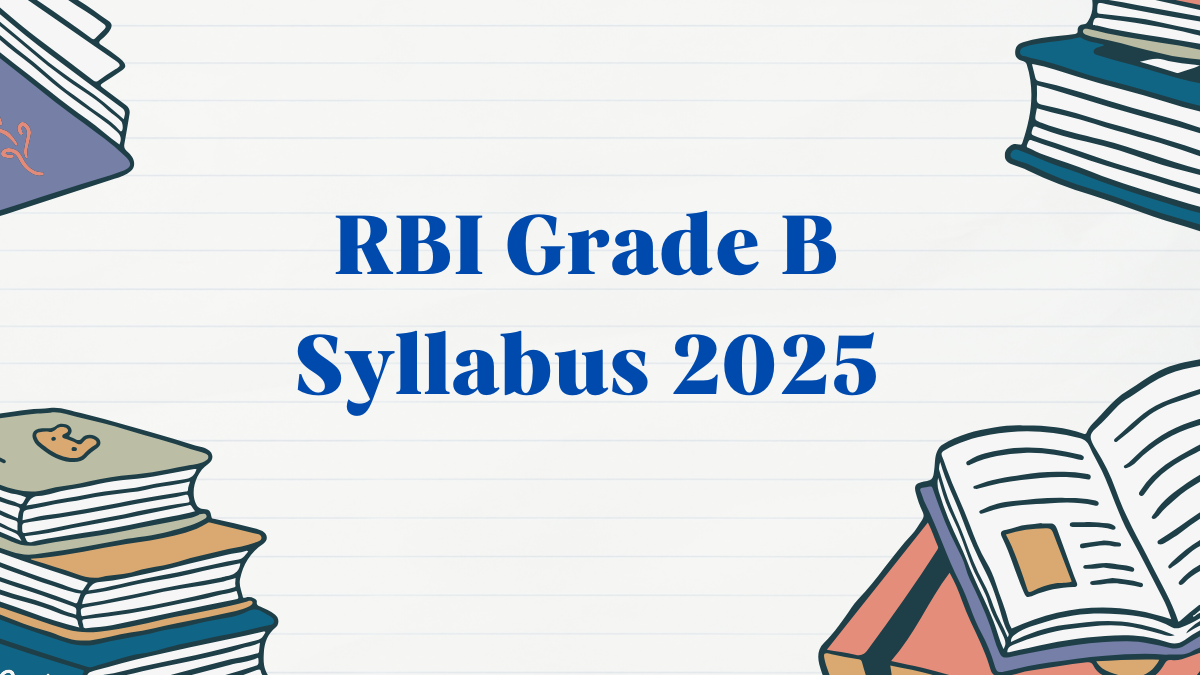

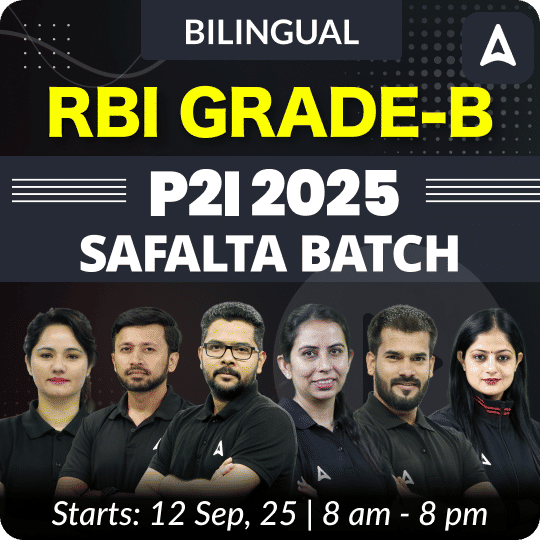

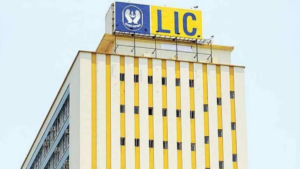 LIC AAO Syllabus and Exam Pattern 2025 f...
LIC AAO Syllabus and Exam Pattern 2025 f...
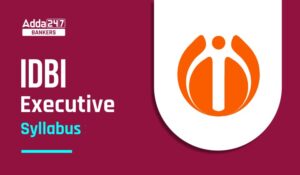 IDBI Executive Syllabus and Exam Pattern...
IDBI Executive Syllabus and Exam Pattern...
 IDBI Junior Assistant Manager Syllabus 2...
IDBI Junior Assistant Manager Syllabus 2...
